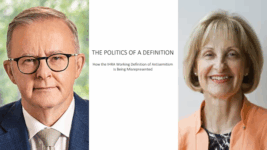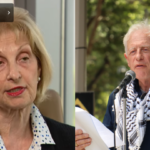Envoy Pressures Australia to Adopt a Fraudulent Antisemitism Definition

Despite noisy outcry from his party’s rank-and-file members, Labor prime minister Anthony Albanese is continuing to consider Australia’s Special Envoy to Combat Antisemitism Jillian Segal’s plan to do just that, which at its core, would result in the IHRA working definition on antisemitism being adopted by all Australian institutions. Yet, an Oxford PhD report reveals this definition to be a fraud.
Released on 10 July 2025, the Plan to Combat Antisemitism recommends the adoption of the IHRA definition at “all levels of government and public institutions”, along with suggesting that Segal, the envoy, be charged with monitoring the media and universities for such prejudice, with tertiary institutions receiving report cards that could see funding cut for any traces of antisemitism.
Since 2018, the Israel lobby has been pushing the IHRA antisemitism definition globally as the gold standard on policing Jewish prejudice. It’s controversial as seven of the eleven accompanying examples involve criticism of Israel. And the definition has come to prominence locally as part of the pushback against the strong pro-Palestinian movement that sprung up due to the Gaza genocide.
Published in April 2021, The Politics of a Definition is a report based on the doctoral research of Oxford University PhD candidate Jamie Stern-Weiner that’s based on a confidential internal memo of an ambassador present at the May 2016 IHRA Plenary meeting, which outlines that despite lobbyists claiming the definition and all of the examples were adopted at the forum, this did not happen.
The report details that not all nations agreed to include the examples of antisemitism and rather the IHRA Plenary decided to only adopt the basic two sentence definition that precedes the examples, and this was the final word of the IHRA decision-making body. Yet, Israel lobbyists have attempted to shove the definition as if it includes the examples down the throats of governments ever since.
River to the sea
“It has been the accepted definition of antisemitism for many years,” Segal told the ABC’s 7.30 on the day of her plan’s release. “It represents a fair attempt to describe what we are seeing, hatred of the Jewish community, hatred of Jews, and the weaponising in relation to various issues in relation to Israel.”
“Now, Israel is the homeland of the Jewish people and criticising Israel is absolutely acceptable, but calling for its destruction is not,” the antisemitism envoy said, as she schooled ABC host Sarah Ferguson on antisemitism or prejudice towards Jewish people.
“Although many people find that offensive – that Israel should not exist – the international definition says that is antisemitic.”
Segal also noted that the Australian government has already endorsed the “non-legally binding working definition of antisemitism”, as IHRA terms it, which occurred under PM Scott Morrison on 14 October 2021, although this was no whole-of-government and other public institution uptake of the definition, in the manner in which the antisemitism envoy appears to be recommending.
In his report, Stern-Weiner explains that the IHRA definition was preceded by another definition developed by the European Monitoring Centre on Racism and Xenophobia (EUMC) and published it in 2005. This included the two line definition and the eleven controversial examples. This was a “work-in-progress”. It was never officially adopted and was dropped after being weaponised.
At the time, Morrison endorsed the IHRA definition, one of the lead drafters of the original EUMC definition Kenneth Stern published an article outlining that starting in 2010 “right-wing Jews” – although in the current political climate it would be better to describe them as Zionists – had been weaponising the definition as a blunt instrument to silence criticism of Israel and its rights abuses.
Zionism is the late 1880s developed European political doctrine that advocates for the creation of a Jewish state in historic Palestine. Its outcome is Israel and the occupied Palestinian territories, as to create the Jewish state required the displacement of the Palestinian people from their homelands, and this would be the reason why individuals might be prone to call for the dissolution of Israel.
The politics of a definition
“Antisemitism is a certain perception of Jews, which may be expressed as hatred toward Jews. Rhetorical and physical manifestations of antisemitism are directed toward Jewish or non-Jewish individuals and/or their property, toward Jewish community institutions and religious facilities,” according to Stern-Weiner this two line definition is what the IHRA Plenary agreed to adopt in 2016.
Not all the nations present at the May 2016 IHRA Plenary in Bucharest meet agreed that the eleven examples of antisemitism should be adopted, and, in particular, Sweden and Denmark didn’t agree to them, as well as the rushed manner in which proceedings were being undertaken. So, the examples were included as examples only for the IHRA to work with and not for any official uptake.
Stern-Weiner’s detailed report shows that the IHRA only adopted the two line definition, despite the obviousness of the statement itself because the examples were too problematic due to their partial and controversial focus on Israel, and they were only ever set out in the manner of a rough draft that was being thrashed out in order to develop an official definition of antisemitism, not a working one.
The controversial examples detailed on the IHRA website, include accusing Israel of exaggerating the Holocaust, claiming it is “a racist endeavour”, applying standards to Israel that no other democratic nation adheres to, using classic antisemitic symbols and images to describe Israel, drawing comparison between Israeli and Nazi policies and holding Jews accountable for Israel’s actions.
Stern-Weiner explains that prior to Zionists and Israel lobby actors commencing to promote the IHRA working definition as including the eleven working examples and as a definition to be officially adopted by governments and institutions circa 2018, the IHRA website had reflected that this was not the case, but he charges it with eventually succumbing to spreading misinformation on its site.
The Oxford PhD candidate meticulously details these developments with the facts being supported by multiple sources. Indeed, he makes clear that when Germany adopted the definition in 2017 and French parliament did the same in 2019, both nations only adopted the two line definition and understood the examples to be separate and IHRA publicly endorsed these developments.
Political criticism is not religious prejudice
The major issue with the IHRA definition in this country right now is that Segal and the Israel lobby are attempting to insert it into the heart of Australian systems specifically because it works to deflect criticism of Israel, which at present is perpetrating a genocide against the Palestinians of Gaza, which has involved close to two years mass slaughter and starvation.
This is the gravest of all atrocity crimes since the Holocaust against the Jewish people of Europe in World War II and yet, civil society opposition to it, which could result in the Australian government shifting its blatant support of Israel in its commission of countless international criminal offences, is being suppressed by accusations of antisemitism, which permit the mass killing to quietly continue.
Antisemitism has become an issue in Australia following the outbreak of the Gaza genocide. And in a similar manner to definition drafter Stern, many consider that antigenocide and pro-Palestinian sentiment is being misconstrued as antisemitism, with the aid of the IHRA working definition, in order to criminalise and then wipe out civil society opposition to Israel’s genocide.
No one refutes that antisemitic incidents and Islamophobic incidents have risen in the Australia community since October 2023, however the former incidents are being weaponised and promoted, while the latter are being ignored.
In fact, Sydney was subject to a spate of so-called antisemitic arson and graffiti crimes over the 2024/25 summer that police revealed later was manufactured by overseas actors, hiring gig criminals to commit the crimes in order to convey an antisemitism crisis to serve their own purposes, while the source of an arson attack on the Addas Israel Synagogue in Melbourne now appears to be similar.
PM Albanese appointed Segal as antisemitism envoy in early July 2024. This was prior to apparent actualisation of an antisemitic crimewave over the summer that turned out to be staged. So, the political climate in this country is no longer prone to believe that the nation is threatened by an apparent mob of antisemitic criminals, but rather it is under threat of overzealous Zionist lobbyists.
The real kicker is that the judiciary agrees that there is an issue, as Federal Court Justice Angus Stewart recently ruled in the July 2025 case Wertheim versus Haddad that anti-Zionism, or criticism of the political doctrine underpinning the Israeli state, as well as straightout criticism of Israel is not antisemitic at all.
“The ordinary, reasonable listener would understand that not all Jews are Zionists or support the actions of Israel in Gaza and that disparagement of Zionism constitutes disparagement of a philosophy or ideology and not a race or ethnic group,” Justice Stewart ruled in his 1 July final findings.
“Needless to say, political criticism of Israel, however inflammatory or adversarial, is not by its nature criticism of Jews in general or based on Jewish racial or ethnic identity,” his Honour threw in just for good measure.
So, lets pray that Albanese has read the Wertheim judgement.







